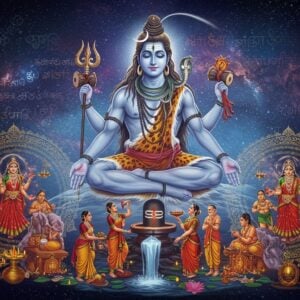
Parshvanatha, a pivotal figure in Jainism, is revered as the 23rd Tirthankara. His life and teachings have profoundly shaped Jain philosophy, guiding numerous followers towards enlightenment. This blog delves into his historical background, his connection with Mahavira, and his core principles that continue to resonate within Jainism today.
Parshvanatha’s History: A Look into the Past
Born in Varanasi, India, around the 8th century BCE to a royal family, Parshvanatha’s early life was steeped in luxury. However, at the age of 30, he renounced worldly possessions to embrace an ascetic life. Historical accounts and Jain scriptures, including the Kalpa Sūtra, chronicle his spiritual journey and teachings. Following 84 days of intense penance, Parshvanatha attained enlightenment on Mount Sammeta, also known as Parasnath Hill in his honor. He played a vital role in revitalizing the Jain community and establishing a structured monastic order.
Parshvanatha’s Significance in Jainism
In Jainism, Parshvanatha is venerated as the 23rd Tirthankara, a spiritual guide who has achieved liberation and guides others on the same path. He established the “Fourfold Restraint” (Chaturyam): non-violence (Ahimsa), truthfulness (Satya), non-stealing (Asteya), and non-possession (Aparigraha). These principles formed the bedrock for the teachings of Mahavira, the 24th Tirthankara. Festivals and rituals dedicated to Parshvanatha, such as Parshvanatha Jayanti, commemorate his invaluable contributions to Jainism.
Parshvanatha and Mahavira: A Spiritual Lineage
Mahavira, the 24th Tirthankara, succeeded Parshvanatha and built upon his teachings. While Parshvanatha introduced the “Fourfold Restraint,” Mahavira added celibacy (Brahmacharya) to establish the “Five Great Vows.” Their lives and doctrines, while sharing similarities, also exhibit distinctions that reflect their unique historical contexts. Mahavira recognized Parshvanatha as a significant predecessor and dedicated himself to unifying and expanding the Jain community.
Parshvanatha’s Teachings: The Fourfold Path
Central to Parshvanatha’s teachings is the “Fourfold Restraint.” These principles serve as ethical and spiritual guideposts for Jains:
- Non-violence (Ahimsa): The practice of causing no harm to any living being, a cornerstone of Jain philosophy.
- Truthfulness (Satya): Adherence to honesty and integrity in thought, word, and deed.
- Non-stealing (Asteya): Refraining from taking anything that is not freely given.
- Non-possession (Aparigraha): Detachment from material possessions and cultivating a spirit of simplicity.
His emphasis on asceticism and self-discipline further strengthened these core tenets.
Poojn.in: Supporting Your Spiritual Journey
Poojn.in, India’s leading online store for cultural and religious goods, offers a wide selection of products to enhance your spiritual practice. We provide high-quality items for various faiths and traditions, ensuring authenticity and reverence.
- Explore our collection of Jain idols and statues:https://www.poojn.in/product/10379/lord-shiva-marble-dust-murti-mahadev-murti-5-inch-approx Find beautifully crafted depictions of Tirthankaras and other revered figures.
- Enhance your puja space:https://www.poojn.in/product/11870/mangalam-camphor-butter-paper-400g-approx-200-pieces Discover a range of incense, diyas, and other puja essentials to create a serene atmosphere for your spiritual practices.
- Deepen your understanding of Jainism:https://www.poojn.in/post/17932/hindu-scriptures-a-detailed-exploration Explore our blog for insightful articles and resources on Jain philosophy, history, and traditions.
Conclusion
Parshvanatha’s life and teachings hold immense significance within Jainism. His transformation from a life of opulence to one of asceticism and enlightenment serves as an inspiration to many. By establishing the “Fourfold Restraint,” he laid the groundwork for ethical conduct and spiritual development. His principles continue to guide Jains in their pursuit of non-violence, truthfulness, non-stealing, and non-possession.
As the 23rd Tirthankara, Parshvanatha’s influence prepared the way for Mahavira and strengthened the Jain community. His legacy, celebrated through rituals and festivals, serves as a reminder of the enduring values he championed. Embracing Parshvanatha’s principles in our daily lives can foster a more compassionate and mindful existence, honoring the path to enlightenment that he illuminated.


